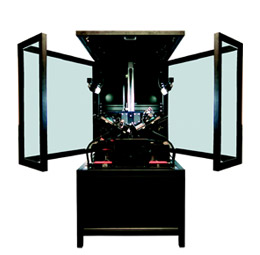JISC recently met with representatives of QIDENUS TECHNOLOGIES, who are prototyping new robotic book scanning technologies.

QiScan RBSpro is a fully automated robotic scanner that uses a robotic rubber “finger”, and no suction technologies, to turn the pages of a book. The “finger” senses the type of paper and the machine sets the right angle for handling the paper. The scanner has been successfully tested with 15th and 16th century books.
Key advantages of this new scanner, QUIDENUS say, are more efficiency in the workflow and lower labour costs, as one operator can work on up to five machines at the same time. Capture and post-processing activities, such as OCR, are very speedy and the scanner is said to produce a digitised and searchable book in 15 minutes!
To see for yourself, you can attend the event at the Bayerische Staatsbibliothek München on 18-20 June 2008 , where QUIDENUS will be demonstrating their new products next to their competitors.
